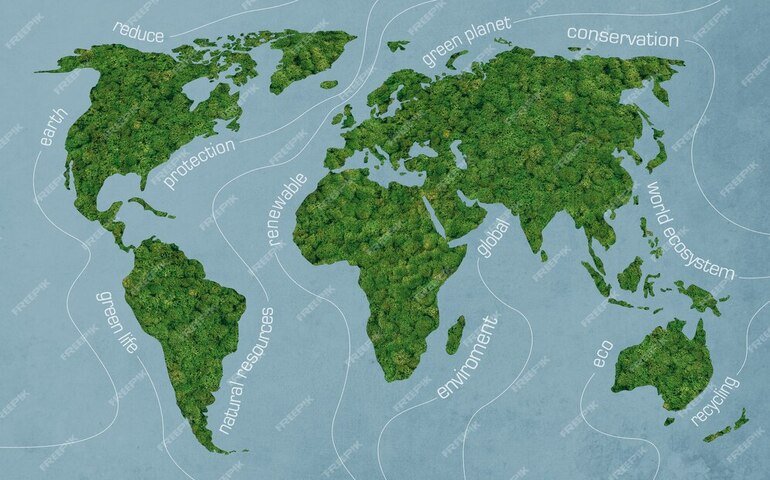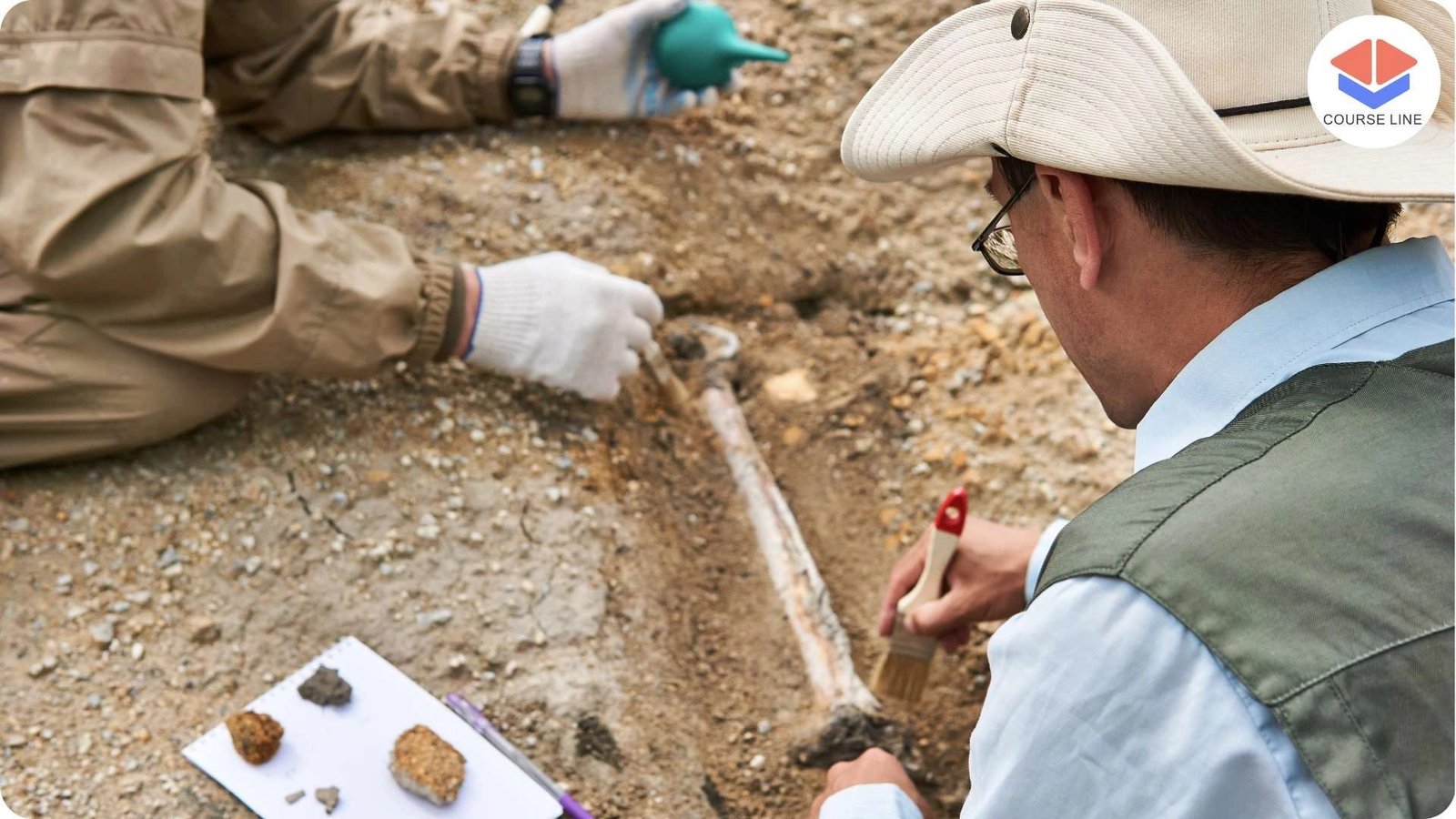Course Features
Price
Study Method
Online | Self-paced
Course Format
Reading Material - PDF, article
Duration
4 hours, 35 minutes
Qualification
No formal qualification
Certificate
At completion
Additional info
Coming soon
- Share
Overview
Geography is a dynamic and interdisciplinary field that examines the interactions between people, places, and the environment. The Geography Level 5 Advanced Diploma offers an in-depth study of physical, human, environmental, and regional geography, equipping students with the skills to analyze and interpret geographic patterns, natural processes, and global issues.
The course begins with Physical Geography, covering fundamental topics such as plate tectonics, geomorphology, climate systems, and biogeography. Students will explore how natural processes shape landscapes and influence ecosystems. The study of weather patterns, ocean currents, and biodiversity provides essential insights into Earth’s dynamic systems.
The Human Geography section delves into population distribution, urbanization, cultural identity, and economic activities. Learners will examine the social and economic forces that shape human settlements, as well as the globalization of industries and migration trends. Special attention is given to urban development, sustainability, and the impact of geopolitics on international relations.
In Environmental Geography, students will analyze the interplay between human activities and the environment. Topics include natural hazards, disaster management, pollution, and climate change. Learners will study how human intervention affects ecosystems and explore solutions for environmental sustainability and resource management.
The Regional Geography component provides an in-depth study of Europe, Africa, Asia, and the Americas, offering a comparative perspective on different geographic landscapes, cultures, and economies. Students will gain insights into regional development, geopolitical conflicts, and socio-economic trends across continents.
A significant portion of the course is dedicated to Geographic Information Systems (GIS) and fieldwork, essential tools for spatial analysis, cartography, and environmental planning. Students will learn mapping techniques, data visualization, and the application of GIS in urban planning, conservation, and disaster management.
The course concludes with Advanced Topics in Geography, covering geopolitics, territorial disputes, sustainable development, and emerging geographic challenges. These lessons provide students with a forward-thinking approach to understanding contemporary and future global issues.
By the end of this diploma, learners will have a well-rounded knowledge of geographic principles, methodologies, and applications, preparing them for academic advancement or careers in urban development, environmental science, GIS technology, or policy-making.
Who is this course for?
Geography is a dynamic and interdisciplinary field that examines the interactions between people, places, and the environment. The Geography Level 5 Advanced Diploma offers an in-depth study of physical, human, environmental, and regional geography, equipping students with the skills to analyze and interpret geographic patterns, natural processes, and global issues.
The course begins with Physical Geography, covering fundamental topics such as plate tectonics, geomorphology, climate systems, and biogeography. Students will explore how natural processes shape landscapes and influence ecosystems. The study of weather patterns, ocean currents, and biodiversity provides essential insights into Earth’s dynamic systems.
The Human Geography section delves into population distribution, urbanization, cultural identity, and economic activities. Learners will examine the social and economic forces that shape human settlements, as well as the globalization of industries and migration trends. Special attention is given to urban development, sustainability, and the impact of geopolitics on international relations.
In Environmental Geography, students will analyze the interplay between human activities and the environment. Topics include natural hazards, disaster management, pollution, and climate change. Learners will study how human intervention affects ecosystems and explore solutions for environmental sustainability and resource management.
The Regional Geography component provides an in-depth study of Europe, Africa, Asia, and the Americas, offering a comparative perspective on different geographic landscapes, cultures, and economies. Students will gain insights into regional development, geopolitical conflicts, and socio-economic trends across continents.
A significant portion of the course is dedicated to Geographic Information Systems (GIS) and fieldwork, essential tools for spatial analysis, cartography, and environmental planning. Students will learn mapping techniques, data visualization, and the application of GIS in urban planning, conservation, and disaster management.
The course concludes with Advanced Topics in Geography, covering geopolitics, territorial disputes, sustainable development, and emerging geographic challenges. These lessons provide students with a forward-thinking approach to understanding contemporary and future global issues.
By the end of this diploma, learners will have a well-rounded knowledge of geographic principles, methodologies, and applications, preparing them for academic advancement or careers in urban development, environmental science, GIS technology, or policy-making.
Requirements
Geography is a dynamic and interdisciplinary field that examines the interactions between people, places, and the environment. The Geography Level 5 Advanced Diploma offers an in-depth study of physical, human, environmental, and regional geography, equipping students with the skills to analyze and interpret geographic patterns, natural processes, and global issues.
The course begins with Physical Geography, covering fundamental topics such as plate tectonics, geomorphology, climate systems, and biogeography. Students will explore how natural processes shape landscapes and influence ecosystems. The study of weather patterns, ocean currents, and biodiversity provides essential insights into Earth’s dynamic systems.
The Human Geography section delves into population distribution, urbanization, cultural identity, and economic activities. Learners will examine the social and economic forces that shape human settlements, as well as the globalization of industries and migration trends. Special attention is given to urban development, sustainability, and the impact of geopolitics on international relations.
In Environmental Geography, students will analyze the interplay between human activities and the environment. Topics include natural hazards, disaster management, pollution, and climate change. Learners will study how human intervention affects ecosystems and explore solutions for environmental sustainability and resource management.
The Regional Geography component provides an in-depth study of Europe, Africa, Asia, and the Americas, offering a comparative perspective on different geographic landscapes, cultures, and economies. Students will gain insights into regional development, geopolitical conflicts, and socio-economic trends across continents.
A significant portion of the course is dedicated to Geographic Information Systems (GIS) and fieldwork, essential tools for spatial analysis, cartography, and environmental planning. Students will learn mapping techniques, data visualization, and the application of GIS in urban planning, conservation, and disaster management.
The course concludes with Advanced Topics in Geography, covering geopolitics, territorial disputes, sustainable development, and emerging geographic challenges. These lessons provide students with a forward-thinking approach to understanding contemporary and future global issues.
By the end of this diploma, learners will have a well-rounded knowledge of geographic principles, methodologies, and applications, preparing them for academic advancement or careers in urban development, environmental science, GIS technology, or policy-making.
Career path
Geography is a dynamic and interdisciplinary field that examines the interactions between people, places, and the environment. The Geography Level 5 Advanced Diploma offers an in-depth study of physical, human, environmental, and regional geography, equipping students with the skills to analyze and interpret geographic patterns, natural processes, and global issues.
The course begins with Physical Geography, covering fundamental topics such as plate tectonics, geomorphology, climate systems, and biogeography. Students will explore how natural processes shape landscapes and influence ecosystems. The study of weather patterns, ocean currents, and biodiversity provides essential insights into Earth’s dynamic systems.
The Human Geography section delves into population distribution, urbanization, cultural identity, and economic activities. Learners will examine the social and economic forces that shape human settlements, as well as the globalization of industries and migration trends. Special attention is given to urban development, sustainability, and the impact of geopolitics on international relations.
In Environmental Geography, students will analyze the interplay between human activities and the environment. Topics include natural hazards, disaster management, pollution, and climate change. Learners will study how human intervention affects ecosystems and explore solutions for environmental sustainability and resource management.
The Regional Geography component provides an in-depth study of Europe, Africa, Asia, and the Americas, offering a comparative perspective on different geographic landscapes, cultures, and economies. Students will gain insights into regional development, geopolitical conflicts, and socio-economic trends across continents.
A significant portion of the course is dedicated to Geographic Information Systems (GIS) and fieldwork, essential tools for spatial analysis, cartography, and environmental planning. Students will learn mapping techniques, data visualization, and the application of GIS in urban planning, conservation, and disaster management.
The course concludes with Advanced Topics in Geography, covering geopolitics, territorial disputes, sustainable development, and emerging geographic challenges. These lessons provide students with a forward-thinking approach to understanding contemporary and future global issues.
By the end of this diploma, learners will have a well-rounded knowledge of geographic principles, methodologies, and applications, preparing them for academic advancement or careers in urban development, environmental science, GIS technology, or policy-making.
-
- Introduction to Physical Geography 00:10:00
- Earth’s Structure and Plate Tectonics 00:00:00
- Geomorphology 00:10:00
- Climatology 00:10:00
- Biogeography 00:10:00
-
- Population Geography 00:10:00
- Cultural Geography 00:10:00
- Economic Geography 00:10:00
- Urban Geography 00:10:00
- Environmental Systems 00:10:00
- Natural Hazards and Disaster Management 00:10:00
- Human Impact on the Environment 00:10:00
- Introduction to GIS 00:10:00
- Mapping and Spatial Analysis 00:10:00
- Fieldwork in Geography 00:10:00
- Exam of Geography Level 5 Advanced Diploma 00:50:00

No Reviews found for this course.
Is this certificate recognized?
Yes, our premium certificate and transcript are widely recognized and accepted by embassies worldwide, particularly by the UK embassy. This adds credibility to your qualification and enhances its value for professional and academic purposes.
I am a beginner. Is this course suitable for me?
Yes, this course is designed for learners of all levels, including beginners. The content is structured to provide step-by-step guidance, ensuring that even those with no prior experience can follow along and gain valuable knowledge.
I am a professional. Is this course suitable for me?
Yes, professionals will also benefit from this course. It covers advanced concepts, practical applications, and industry insights that can help enhance existing skills and knowledge. Whether you are looking to refine your expertise or expand your qualifications, this course provides valuable learning.
Does this course have an expiry date?
No, you have lifetime access to the course. Once enrolled, you can revisit the materials at any time as long as the course remains available. Additionally, we regularly update our content to ensure it stays relevant and up to date.
How do I claim my free certificate?
I trust you’re in good health. Your free certificate can be located in the Achievement section. The option to purchase a CPD certificate is available but entirely optional, and you may choose to skip it. Please be aware that it’s crucial to click the “Complete” button to ensure the certificate is generated, as this process is entirely automated.
Does this course have assessments and assignments?
Yes, the course includes both assessments and assignments. Your final marks will be determined by a combination of 20% from assignments and 80% from assessments. These evaluations are designed to test your understanding and ensure you have grasped the key concepts effectively.
Is this course accredited?
We are a recognized course provider with CPD, UKRLP, and AOHT membership. The logos of these accreditation bodies will be featured on your premium certificate and transcript, ensuring credibility and professional recognition.
Will I receive a certificate upon completion?
Yes, you will receive a free digital certificate automatically once you complete the course. If you would like a premium CPD-accredited certificate, either in digital or physical format, you can upgrade for a small fee.
Course Features
Price
Study Method
Online | Self-paced
Course Format
Reading Material - PDF, article
Duration
4 hours, 35 minutes
Qualification
No formal qualification
Certificate
At completion
Additional info
Coming soon
- Share
Archaeology Level 8 Advanced Diploma
Course Line241£490.00Original price was: £490.00.£14.99Current price is: £14.99.Carpentry and Joinery Level 3 Advanced Diploma
Course Line246£490.00Original price was: £490.00.£14.99Current price is: £14.99.Voice Actor Training
Course Line238£490.00Original price was: £490.00.£14.99Current price is: £14.99.
Related Courses
Mastering Statics: Principles and Applications in Engineering Mechanics
£490.00Original price was: £490.00.£14.99Current price is: £14.99. 237
237Mining Engineering Level 3 Advanced Diploma
£490.00Original price was: £490.00.£14.99Current price is: £14.99. 241
241History Level 3 Advanced Diploma
£490.00Original price was: £490.00.£14.99Current price is: £14.99. 240
240
Related Courses
Mastering Statics: Principles and Applications in Engineering Mechanics
£490.00Original price was: £490.00.£14.99Current price is: £14.99. 237
237Mining Engineering Level 3 Advanced Diploma
£490.00Original price was: £490.00.£14.99Current price is: £14.99. 241
241History Level 3 Advanced Diploma
£490.00Original price was: £490.00.£14.99Current price is: £14.99. 240
240








